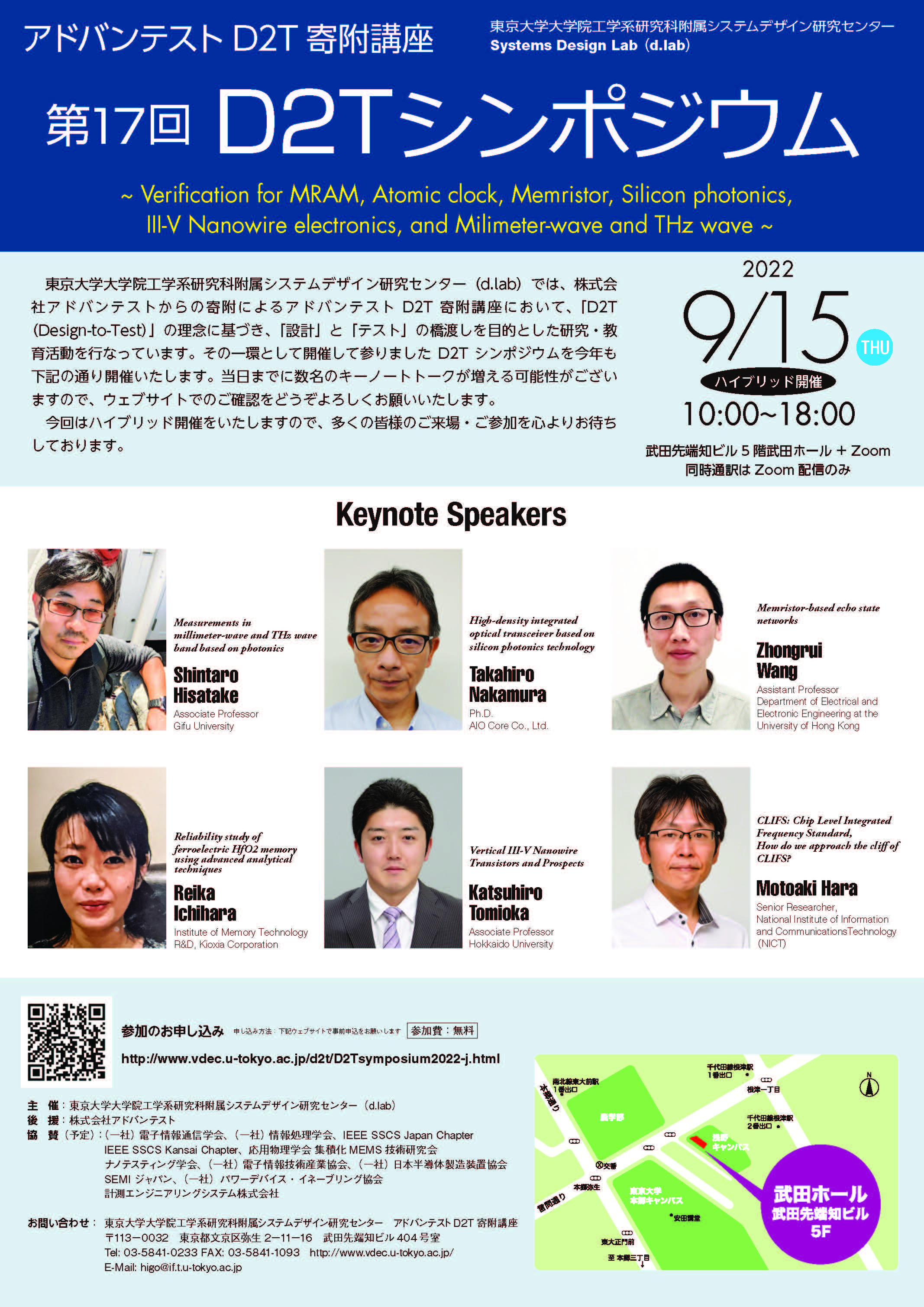The 17th D2T Symposium, The University of Tokyo
September 15th (Thu.), 2022
Hybrid Conference
On site: Takeda Hall, 5th floor of Takeda Building, The University of Tokyo
Online: Zoom
News:
- Symposium homepage was opened. (2022/8/1)
Symposium Overview

From the organizer:
"D2T Symposium" will be held on 15th September, 2022, as 17th meeting of symposium series first started in 2008.We have been pursuing in "design", "test", and their bridging technologies in the symposia as indicated in the name "D2T" that means "Design to Test".
This year, we will invite lecturers overseas, Assistant Professor, Zhongrui Wang from Hong Kong University, Reika Ichihara from Institute of Memory Technology R&D, Kioxia Corporation, Associate Professor Shintaro Hisatake from Gifu University, Takahiro Nakamura, Ph.D. from AIO Core Co., Ltd.,
Dr. Motoaki Hara, Senior researcher from National Institute of Information and CommunicationsTechnology (NICT) , Associate Professor Katsuhiro Tomioka from Hokkaido University, for their distinguished research topics.
We look forward to all of your participation in the symposium.
10:00 |
Opening remarks |
Makoto Ikeda,Professor, d.lab, school of Engineering, the University of Tokyo
|
|
10:10 - 11:40 |
Session 1 - Special Lecture I
|
"Measurements in millimeter-wave and THz wave band based on photonics"
|
|
"High-density integrated optical transceiver based on silicon photonics technology"
|
|
11:40 - 13:10 |
lunch break |
13:10 - 14:40 |
Sesson 2 - Sepecial Lecture II
|
"Reliability study of ferroelectric HfO2 memory using advanced analytical techniques"
|
|
"Memristor-based echo state networks"
|
|
14:40 - 14:55 |
15 min break |
14:55 - 16:15 |
Session 3 - Special Lecture III
|
"Vertical III-V Nanowire Transistors and Prospects"
|
|
"CLIFS: Chip Level Integrated Frequency Standard, How do we approach the cliff of CLIFS? "
|
|
16:15 - 16:30 |
Sesson 4 - Activities of D2T Research Department and Special Lecture IV
|
"Activities of Advantest D2T department"
|
|
Closing
|
Symposium abstract (日本語版, Japanese version)
"Memristor-based echo state networks"
|
"Reliability study of ferroelectric HfO2 memory using advanced analytical techniques"
|
"Measurements in millimeter-wave and THz wave band based on photonics"
|
"High-density integrated optical transceiver based on silicon photonics technology"
|
"CLIFS: Chip Level Integrated Frequency Standard, How do we approach the cliff of CLIFS? "
|
"Vertical III-V Nanowire Transistors and Prospects"
|
"Activity report of D2T research department"
|
Registration (free of charge)
D2T Symposium history
Contact
ADVANTEST D2T Research Department,
Sysmtems Design Lab (d.lab), School of Engineering, The University of Tokyo
Room 404, Takeda Building,
Yayoi 2-11-16, Bunkyo-ku, Tokyo, 113-0032, Japan
Tel: +81-3-5841-0233 FAX: +81-3-5841-1093
E-mail: higo[at]if.t.u-tokyo.ac.jp
Systems Design Lab. (d.lab), School of Engineering, The University of Tokyo